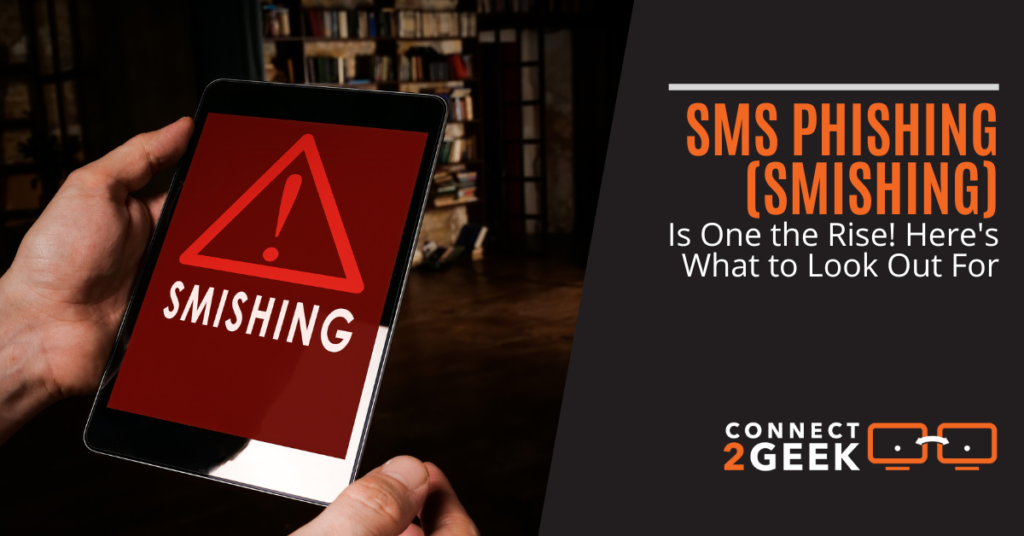
Most people are aware that they will get phishing emails in their inboxes. Email scams have been around for decades now, and people often will pause before they interact with an email that looks in any way suspicious.
But another form of phishing that is growing fast is not so familiar. Phishing messages that come in by text message – aka “smishing” – are only known about by roughly 35% of the population.
People still have a false sense that text messages they receive will only come from friends, family, colleagues, or businesses to which they have provided their mobile phone number.
But those numbers are no longer as private as you might think. Cybercriminals can easily purchase large lists of these numbers from sources on the Dark Web. They can also be obtained through advertisers that purchase them from cell providers and others.
Have you noticed an uptick in the number of texts you receive from retailers and service providers? Such as shipping notices, dental appointment and prescription reminders, coupons, and sale notices. The fact that these organizations are using SMS to bypass crowded email inboxes is making it easier for scammers to catch unsuspecting victims with smishing.
During the first 6 months of 2021, phishing by SMS rose by nearly 700%. It’s a problem that is only becoming larger, and one that could put a serious dent in a company’s network security if not addressed.
Here are some of the common smishing tactics you need to beware of, because one may be coming into your phone very soon!
Fake Service Appointment
This recent scam targeted neighborhoods that had just had the new AT&T fiber cables installed. Once the installation was over, AT&T knocked on doors to sign people up for the new service.
Some of those that signed up received a text message pretending to be from AT&T asking for personal details to schedule their installation appointment.
One savvy resident saw that the text had his address wrong and also asked for details he had already given the AT&T representative, so luckily, he avoided falling for this scam.
Problem With a Delivery
Who doesn’t love receiving packages in the mail? That’s what scammers are hoping for when sending this fake text claiming there is a problem with a package delivery.
The scam will ask the person to either sign in to a fake phishing site or ask for personal details that can then be used to steal their identity. There is no delivery at all, it’s a smishing scam.
COVID Detection Scare
This phishing message is a text that tells the recipient that someone they’ve been in contact with has tested positive for COVID. It provides a link for the person to get more details and see what they need to do next.
These types of scams use social engineering to play on a person’s fears and get them to click the link before they have a chance to fully scrutinize the message.
Offer of a Coupon or Free Gift
Another popular smishing scam is a text that simply says, “Thank you for your recent payment. Here is a free gift for you.” It includes a link to a malicious website.
This scam can be particularly effective because people shop and pay bills online all the time, so it’s not unusual to have just made a payment to someone. It also triggers the reward emotion, where a person feels they’re being given a free gift as a reward.
Suspicious Activity Detected On Your Account
This smishing scam will purport to be from Netflix, Amazon, or another popular cloud service. It will claim that there has been suspicious activity detected on your account and ask you to click a link to change your password for your security.
Of course, it is ironic that a phishing scam is offering to help you be more secure. But this is a tactic used to get people to trust the message.
The link will take the victim to a fake login page that might look exactly like the one they’re used to for that service. It’s designed to steal their password, which is promptly sold or used for financial gain.
Free Tax Credit or Government Rebate
With all the state and federal programs around the pandemic, it’s easy for people to be enticed with a promise about a new government credit or rebate that might mean more cash in their pocket.
This fake SMS warns people that they are about to miss out on getting their share of a government credit/rebate and to click a link to sign up.
Improve Your Mobile Device Security to Avoid SMS-based Phishing
Connect2Geek can help your Treasure Valley area home or business improve the security on your mobile devices, so they are less susceptible to text-based malware and phishing.
Schedule your free consultation to learn more today! Call 208-468-4323 or reach out online.
